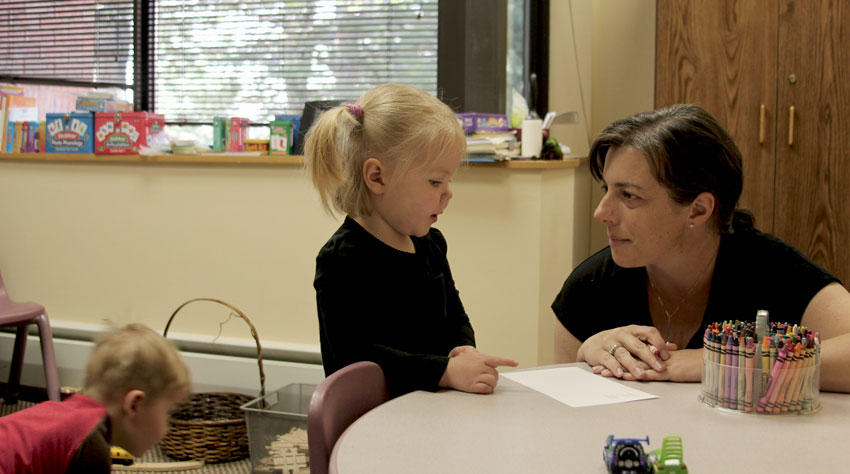Childhood apraxia of speech (CAS) is a motor speech disorder. Children with CAS have problems saying sounds, syllables, and words. This is not because of muscle weakness or paralysis. The brain has problems planning to move the body parts (e.g., lips, jaw, tongue) needed for speech. The child knows what he or she wants to say, but his/her brain has difficulty coordinating the muscle movements necessary to say those words.
 Not all children with CAS are the same. Some of the signs and symptoms listed below may not be present in every child. General things to look for include the following:
Not all children with CAS are the same. Some of the signs and symptoms listed below may not be present in every child. General things to look for include the following:
We perform a hearing evaluation to rule out hearing loss as a possible cause of the child's speech difficulties. We are certified-SLPs with knowledge and experience with CAS. After we assess the child's oral-motor abilities, melody of speech, and speech sound development, the SLP can diagnose CAS and rule out other speech disorders, unless only a limited speech sample can be obtained making a firm diagnosis challenging.

Children with CAS have more success when they receive frequent (3-5 times per week) and intensive treatment. They also respond better when seen alone for treatment as opposed to being treated in groups. As the child improves, they may need treatment less often, then group therapy may be an option.
We focus on improving the planning, sequencing, and coordination of muscle movements for speech production. Isolated exercises designed to "strengthen" the oral muscles will not help with speech. CAS is a disorder of speech coordination, not strength.
To improve speech, the child must practice speech. However, getting feedback from a number of senses, such as tactile "touch" cues and visual cues (e.g., watching him/herself in the mirror) as well as auditory feedback, is often helpful. With this multi-sensory feedback, the child can more readily repeat syllables, words, sentences and longer utterances to improve muscle coordination and sequencing for speech.
Practice at home is very important. Families will often be given assignments to help the child progress and allow the child to use new strategies outside of the treatment room, and to assure optimal progress in therapy. It is important to remember is that treatment of apraxia of speech takes time and commitment. Children with CAS need a supportive environment that helps them feel successful with communication.

My husband and I are grateful to Cobblestone for everything they have done for our daughter Scarlett. We have had the pleasure of working with Lynn and it has been a life changing experience for our whole family. Scarlett has gained so much confidence in her abilities and we feel fortunate to have had this opportunity to work with them on her speech goals. We know that with their tools she will have a different level of learning than that of her peers. In addition, Jodie has been a delight to work with from getting us started to answering any questions we have in a timely manner. They treat you like part of the family and they truly care about your child.
Alana Kelly – 8 year-old daughter
We moved here last year and found Cobblestone to continue my then 4 year olds Apraxia therapy with Miss Samantha. Last week he had his last session. It’s been a wonderful year working with Samantha and Lynn and we are going to miss them so much. Samantha was a great therapist and worked so well with my son. Lynn is such a wonderful, kind, and caring woman and I truely enjoyed our afternoon chats. She runs her business so professionally, yet when you walk in the door, you feel like family. We had some issues with our insurance company and she worked so hard to get things fixed so that we didn’t have to deal with them ourselves.
Stacy Cote – 4 year-old son
We love Cobblestone! We have worked with several therapists over the past 3 years at Cobblestone. Each one has been easy to work with and adaptable to my sons needs. Due to Covid restrictions, we are seeing Kimberly remotely every week. I wasn't sure if remote therapy would be a great fit for my son, but she has made the transition extremely easy and engaging. He continues to work on and gain skills with every session. Kimberly is able to hold his attention for most of the session. Way to adapt Cobblestone! Thank you.
Jenn Grey –5 year-old son
First visit: Your first visit is an opportunity for the therapist, child and yourself to meet prior to an evaluation or intervention. You are welcome to bring siblings and other family members to this visit. The therapist will take this opportunity to informally observe your child's communication and play skills ... Learn more »
First visit: You will be coming to visit me soon at my office. When you arrive I will greet you and we will have some time to play and get to know each other. I will show you where the games and toys are and you will be able to pick out a couple that we can play with together ... Learn more »
7761 Shaffer Pkwy
Ste 140
Littleton, Colorado 80127
Phone: 303-952-9038
Fax: 720-622-9901